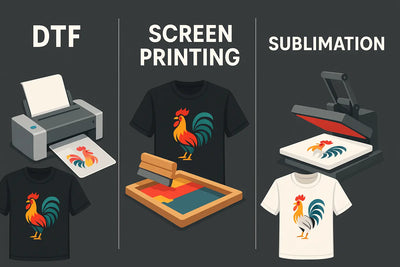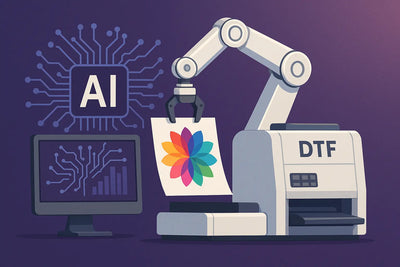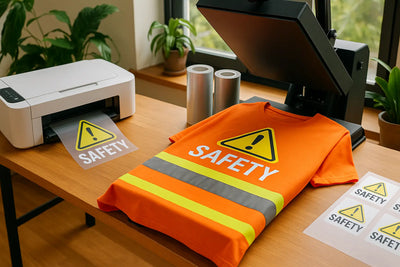

DTF vs Screen Printing vs Sublimation: 2025 Cost & Quality Comparison
Jul 14, 2025 (Updated on Sep 26, 2025)
Choosing the right printing method can make or break your custom apparel business. With DTF printing gaining massive market share, screen printing remaining a traditional favorite, and sublimation holding its niche, understanding the true costs, quality differences, and applications for each method is crucial for smart business decisions in 2025.
This comprehensive analysis breaks down the real numbers, hidden costs, and quality considerations to help you choose the optimal printing strategy for your specific business needs.
Executive Summary: The Printing Method Landscape
DTF (Direct-to-Film): Emerging as the most versatile option with excellent quality-to-cost ratio
Screen Printing: Still cost-effective for large runs but losing ground on flexibility
Sublimation: Dominant for polyester applications but limited fabric compatibility
The surprising finding: DTF has become the most cost-effective option for 70% of custom apparel applications when all factors are considered.
DTF Printing: The Versatile Champion
Cost Structure Breakdown
Setup Costs:
- Equipment investment: $15,000-$50,000
- Professional service option: $0 initial investment
- Monthly materials: $800-$2,500
- Labor requirements: 1-2 people
Per-Piece Costs (Professional Service):
- Single transfers: $0.75-$3.50
- Gang sheet optimization: $0.45-$1.25
- Bulk transfers by size: $0.59-$2.00
Quality Characteristics
Strengths:
- Excellent detail reproduction (300+ DPI capability)
- Vibrant colors on dark and light fabrics
- Soft hand feel after proper application
- 50+ wash durability when done professionally
- Works on cotton, polyester, and blends
Limitations:
- Slightly raised feel compared to sublimation
- Requires heat press application
- White ink management complexity (equipment-based)
Best Applications:
- Small to medium runs (1-500 pieces)
- Complex, multi-color designs
- Mixed fabric types in single orders
- Rush orders requiring quick turnaround
- Variable data printing (names, numbers)
Screen Printing: The Traditional Workhorse
Cost Structure Breakdown
Setup Costs:
- Equipment investment: $5,000-$25,000
- Screen setup: $25-$75 per color
- Monthly materials: $300-$1,200
- Labor requirements: 2-4 people
Per-Piece Costs:
- Large runs (500+): $1.50-$4.00
- Medium runs (100-499): $3.00-$7.00
- Small runs (1-99): $8.00-$15.00
Quality Characteristics
Strengths:
- Lowest cost for large quantities
- Excellent opacity and color saturation
- Proven durability (100+ washes)
- No equipment limitations on production speed
- Professional appearance and feel
Limitations:
- High setup costs for complex designs
- Limited detail reproduction capability
- Color changes require new screens
- Not cost-effective for small runs
- Setup time delays quick turnarounds
Best Applications:
- Large runs (500+ pieces)
- Simple designs with few colors
- Corporate uniforms and bulk orders
- Promotional items for events
- Long-term recurring orders
Sublimation: The Polyester Specialist
Cost Structure Breakdown
Setup Costs:
- Equipment investment: $8,000-$30,000
- Transfer papers and inks: $200-$800/month
- Heat press: $1,500-$5,000
- Labor requirements: 1-2 people
Per-Piece Costs:
- Polyester items: $1.25-$4.50
- Specialized substrates: $2.50-$8.00
- Ceramic/metal items: $3.00-$12.00
Quality Characteristics
Strengths:
- Unlimited color capability
- Photographic quality reproduction
- No hand feel (ink becomes part of fabric)
- Permanent, fade-resistant results
- Excellent for complex gradients and photos
Limitations:
- Only works on polyester and polymer-coated items
- Light-colored substrates only
- Requires specific fabric compositions (65%+ polyester)
- Limited fabric options reduce market flexibility
Best Applications:
- Polyester apparel and sportswear
- Photo reproduction on fabric
- Personalized gifts and awards
- Athletic and performance wear
- All-over print designs
2025 Cost Comparison Analysis
Small Orders (1-25 pieces)
DTF Professional Service:
- Cost per piece: $2.50-$4.00
- Setup time: None
- Turnaround: Same day possible
- Total project cost: $62.50-$100
Screen Printing:
- Setup fees: $150-$300
- Cost per piece: $8.00-$12.00
- Turnaround: 5-7 days
- Total project cost: $350-$600
Sublimation (polyester only):
- Cost per piece: $3.50-$6.00
- Setup time: Minimal
- Turnaround: 2-3 days
- Total project cost: $87.50-$150
Winner: DTF for versatility and cost-effectiveness
Medium Orders (100-250 pieces)
DTF Professional Service:
- Gang sheet optimization: $1.25-$2.00
- Volume discounts available
- Turnaround: 24-48 hours
- Total project cost: $125-$500
Screen Printing:
- Setup fees: $200-$400
- Cost per piece: $3.50-$5.50
- Turnaround: 3-5 days
- Total project cost: $550-$1,775
Sublimation (polyester only):
- Cost per piece: $2.50-$4.00
- Setup minimal
- Turnaround: 2-4 days
- Total project cost: $250-$1,000
Winner: DTF for speed and versatility; sublimation for polyester-only projects
Large Orders (500+ pieces)
DTF Professional Service:
- Bulk gang sheet pricing: $0.75-$1.50
- Enterprise volume discounts
- Turnaround: 2-3 days
- Total project cost: $375-$750
Screen Printing:
- Setup fees: $300-$600
- Cost per piece: $1.75-$3.25
- Turnaround: 5-7 days
- Total project cost: $1,175-$2,225
Sublimation (polyester only):
- Cost per piece: $1.75-$3.50
- Bulk material savings
- Turnaround: 3-5 days
- Total project cost: $875-$1,750
Winner: DTF maintains competitive edge even at high volumes
Quality Comparison Matrix
|
Factor |
DTF |
Screen Printing |
Sublimation |
|
Detail Reproduction |
Excellent (300+ DPI) |
Good (limited detail) |
Excellent (photo quality) |
|
Color Vibrancy |
Excellent |
Excellent |
Outstanding |
|
Wash Durability |
50+ washes |
100+ washes |
Permanent |
|
Hand Feel |
Soft (slight texture) |
Varies by ink type |
No feel (part of fabric) |
|
Fabric Compatibility |
Universal |
Universal |
Polyester only |
|
Design Complexity |
Unlimited |
Limited by screens |
Unlimited |
|
Production Speed |
Fast |
Slow setup, fast run |
Medium |
|
Color Matching |
Excellent with AI |
Excellent |
Excellent |
Hidden Costs Analysis
DTF Hidden Costs
- Equipment maintenance: $200-$500/month (if self-operated)
- Ink waste: 5-10% typical
- Learning curve: 2-3 months to proficiency
- Quality control: Testing and reprints
Professional Service Advantage: DTF services eliminate most hidden costs
Screen Printing Hidden Costs
- Screen storage and cleaning: $50-$150/month
- Ink mixing and waste: 10-15% material loss
- Labor-intensive setup: 30-60 minutes per job
- Equipment maintenance: $300-$800/month
Sublimation Hidden Costs
- Paper waste: 5-10% typical
- Ink consumption: Higher than rated
- Heat press maintenance: $100-$300/month
- Limited substrate options: Reduced market opportunities
Application-Specific Recommendations
Sports Teams and Athletic Wear
Best Choice: DTF for versatility, sublimation for performance polyester
Why DTF Wins:
- Works on all fabric types (cotton, poly, blends)
- Excellent for team names and numbers
- Gang sheet efficiency for bulk orders
- Quick turnaround for urgent needs
Corporate and Business Apparel
Best Choice: DTF for mixed orders, screen printing for large uniform runs
DTF Advantages:
- Mix different garment types in single order
- Professional appearance and durability
- Custom sizing options for employee fitting
- No minimum order requirements
Event and Promotional Items
Best Choice: DTF for flexibility and speed
Key Benefits:
- Same-day turnaround available
- No setup fees for last-minute changes
- Works on various promotional items
- Cost-effective for any quantity
Fashion and Retail
Best Choice: DTF for product development, sublimation for specialized lines
Strategic Considerations:
- DTF allows rapid prototyping and testing
- Sublimation excels for performance wear lines
- Both offer unlimited design complexity
ROI Analysis by Business Model
Small Custom Apparel Business
DTF Professional Service Model:
- Initial investment: $500-$2,000
- Monthly revenue potential: $5,000-$15,000
- Profit margin: 65-75%
- ROI: 300-500% annually
Screen Printing Model:
- Initial investment: $8,000-$15,000
- Monthly revenue potential: $4,000-$12,000
- Profit margin: 45-60%
- ROI: 150-250% annually
Medium-Scale Operation
DTF Partnership Strategy:
- Focus on sales and customer service
- Use professional gang sheet services for production
- Scale without equipment investment
- Advantage: 40% faster growth rate
Mixed Method Strategy:
- DTF for small/medium orders
- Screen printing for large runs
- Sublimation for specialized products
- Complexity: Higher but potentially more profitable
Decision Framework: Choosing Your Method
Choose DTF When:
- Order sizes vary significantly
- Quick turnaround is important
- Design complexity is high
- Fabric types are mixed
- Starting or growing a business
- Testing market demand
Choose Screen Printing When:
- Consistent large orders (500+ pieces)
- Simple designs with few colors
- Long-term contracts are available
- Maximum durability is required
- Labor costs are low
Choose Sublimation When:
- Focusing exclusively on polyester products
- Photo-quality reproduction is required
- Performance wear is your niche
- All-over printing is common
- Personalization is key
Technology Integration Considerations
DTF Technology Advantages
- AI color matching ensures consistency
- Automated gang sheet optimization reduces costs
- Smart workflow integration improves efficiency
- Quality control systems minimize defects
Professional services like DTF Dallas leverage these technologies without requiring your investment.
Future-Proofing Your Choice
- DTF Trajectory: Continued improvement in speed, quality, and cost-effectiveness
- Screen Printing: Stable technology with limited innovation potential
- Sublimation: Growing substrate options but fabric limitations remain
Making the Strategic Choice
Questions to Guide Your Decision
- What's your typical order size range?
- How important is quick turnaround?
- What fabric types do you work with?
- How complex are your designs?
- What's your growth strategy?
- How much can you invest upfront?
Hybrid Strategies
Many successful businesses use multiple methods strategically:
- DTF for flexibility and speed via professional services
- Screen printing for large, recurring orders
- Sublimation for specialized polyester products
Conclusion: DTF Emerges as the Clear Winner for Most Applications
The 2025 analysis reveals DTF printing as the most versatile and cost-effective solution for the majority of custom apparel applications. When partnering with professional services that offer optimized gang sheet processing and flexible sizing options, DTF provides:
- Superior cost-effectiveness across all order sizes
- Unmatched flexibility in fabric and design options
- Professional quality without equipment investment
- Scalability that grows with your business
While screen printing maintains advantages for very large runs and sublimation excels for polyester-specific applications, DTF's versatility makes it the smart choice for businesses seeking growth and flexibility in the dynamic custom apparel market.
The key insight: Success in 2025 isn't about choosing the "best" printing method—it's about choosing the method that best serves your business model and growth strategy.
Ready to experience the DTF advantage? Explore our professional gang sheet services and custom transfer solutions to see why DTF is dominating the custom apparel market in 2025.
Contact DTF Dallas for expert consultation on choosing the optimal printing strategy for your business goals and growth plans.
Comments 0
Be the first to leave a comment.




